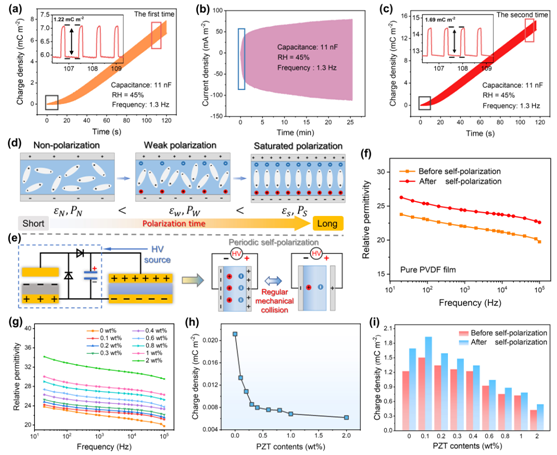The research group of Professor Hu Chenguo from the School of Physics of Chongqing University has recently published a research paper titled Achieving Remarkable Charge Density via Self-Polarization of Polar High-k Material in a Charge-Excitation Triboelectric Nanogenerator in Advanced Materials. Chongqing University is the first affiliation and postgraduate student Wu Huiyuan and doctoral candidate He Wencong of Chongqing University are first co-authors of the paper. Prof. Hu Chenguo of Chongqing University and Post-doctor Liu Wenlin from Peking University are corresponding co-authors.

In recent years, as a new energy collection technology, triboelectric nanogenerator (TENG) based on friction electrification and electrostatic induction coupling has been under the spotlight because of its low cost, extensive range of material selection, light weight and obvious advantages in low-frequency energy collection. However, a core problem that is hindering extensive application and commercialization of TENG is its low output power, which is the result of the low output charge density. In previous researches, researchers have made various efforts to improve the output charge density of TENG, such as material selection, friction layer modification, control of environmental conditions, charge pumping, and charge excitation. Now, though the output charge density of TENG has been increased to a certain value, it is still unable to supply adequate power to high-power devices. As such, further improving the charge density with stable output is of great significance for the development and application of TENG.
This research group carried out related research and proposed the self-polarization effect of highly polar dielectric materials for the first time. The research group used the directional high electric field generated by charge excitation, and successfully deflected the dipole moment in the polar composite film along the direction of the electric field. In the process of periodic contact separation between steel sheet electrode and composite membrane, the composite membrane with piezoelectric properties would be under constant collision stress, which further improves the deflection speed of dipole moment. This way, the polar composite film realizes self-polarization in the working process of charge-excited friction nanogenerator, and effectively improves the actual relative dielectric constant of the composite membrane, which significantly increases the charge density of TENG and obtains a stable ultra-high output charge density of 3.53 mC m-2. This research has provided a simple and effective method for thin-membrane polarization, and is of great inspiring significance for further improvement of the output of TENGs.
Link of the paper: https://doi.org/10.1002/adma.202109918
